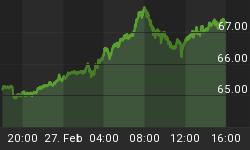Gold News Monitor originally published on June 3, 2015, 6:26 AM.
Goldman Sachs' chief equity strategist, David Kostin, said that "by almost any measure, US equity valuations look expensive", which echoed Robert Shiller's earlier opinion. Is the U.S. stock bubble finally going to burst? How will it affect the gold market?
More and more analysts are warning against a U.S. stock market bubble. Last weekend, Yale professor and Nobel Prize winner Robert Shiller said that in his opinion U.S. stocks were overvalued. Although he is not sure that the current situation is a classic bubble, he clearly sees the bubble element. For example, Shiller pointed out that the CAPE (cyclically adjusted P/E) ratio has been recently around 27, which is high by U.S. historical standards (the only other times it was that high or higher were in 1929, 2000, and 2007 - all moments before market crashes). What is more, his valuation confidence has recently reached its lowest point since the stock market peak in 2000, implying that people do not believe that current stock valuations are about right. The Nobel laureate also noticed that, unlike 1929, this time all asset classes (and not only stocks) seem to be overvalued.
Shiller's opinion was shared a few days later by Goldman Sachs's chief equity strategist David Kostin in his latest weekly note to clients. He pointed out that financial metrics such as EV/EBITDA, EV/Sales, and P/B suggest that U.S. stocks have stretched valuations. He also noticed that the typical stock in the S&P 500 trades at 18.1x forward earnings, ranking at the 98th percentile of historical valuation since 1976. According to Kostin, with tightening on the horizon, the P/E expansion phase of the current bull market is behind us.
What does it all mean for the gold market? Well, the inevitable correction in the U.S. stock market should be positive for the gold price, since a surging stock market hurts demand for the yellow metal. Indeed, investors cut holdings in bullion-backed exchange-traded products to the lowest since 2009 as they are looking more at the stock markets rather than buying into the precious metals. Having said that, it is even more surprising that gold has held around $1200 for two years now. Of course, nobody knows for sure when the stock market boom will end. However, it seems that the irrational exuberance will last some time thanks to corporate buybacks. Indeed, the share repurchases seem to be the biggest driver of rises in the U.S. stock market. Goldman's analyst forecasts that buybacks will surge by 18% in 2015 exceeding $600 billion.
To sum up, more and more analysts are warning against a U.S. stock market bubble, including Nobel Prize winners and Goldman Sachs. It may be a landmark, since what Goldman says often becomes policy. Yellen some time ago admitted that stock market prices were quite high. When the Fed hikes rates - to save its credibility - the stock market boom will end. This could be positive for the gold market, as investors could then fly away from U.S. stocks and the demand for precious metals would increase.
Regards,















